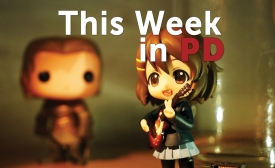smart & soft power

Bollywood’s global popularity and the ‘Cool Japan’ initiative are highlighted in this week’s roundup.
An analogy usually works as a low-risk way to make a point. The secret is to stick to comparisons that garner near-universal support. President Trump did it in February when he talked about the need for bold infrastructure projects like Eisenhower’s Interstate Highway System. Last year Sen. Lindsey Graham proposed a Marshall Plan for the Middle East. President Obama launched the Cancer Moonshot, a nod to the Apollo program.
The many ways in which countries can cooperate in promoting cultural heritage and intercultural dialogue were the main topics discussed by the foreign ministers of Greece, Italy, China, Egypt, India, Iran, Iraq, Peru, Bolivia and Mexico in the “Ancient Civilizations” conference held in Athens on Monday. [...] Well-known Greek and foreign archaeologists, professors and museum directors from these ten countries spoke about the proposed actions and successful examples of culture management.
While China’s presence and influence in Africa is well documented – especially regarding resource extraction – another element is increasingly becoming an important economic and political tool: traditional Chinese medicine. Chinese involvement in Africa has long included a prominent medical presence, with Beijing supporting medical efforts on the continent for decades. As China’s export capacity increased in the late 1990s and early 2000s
Greek Foreign Minister Nikos Kotzias said that the upcoming Forum of Ancient Civilizations conference, hosted by Greece, will bring together countries with some of the world's oldest cultures to find ways of exercising soft power across the world.[...] The two-day conference is due to take place in the Greek capital of Athens on Sunday and will feature representatives from China, India, Iraq, Iran, Egypt, Italy, Mexico, Peru, Bolivia as well as Greece.
Our hyper-connected world has put more power in the hands of individuals and other non-state actors – from NGOs like Greenpeace to transnational terror groups like the so-called Islamic State. Over the past decade, foreign ministries have responded by becoming increasingly sophisticated in their communication strategies. Diplomats need to communicate directly with foreign publics to explain foreign policies, and to mobilize governments and civil society to support their aims.
Many view Europe as a spent force in global politics. Conventional wisdom states that world politics today is unipolar, with the United States as the sole superpower. Or perhaps it is multipolar, with China, India, and the rest rising to challenge Western powers. Either way, Europe's role is secondary - and declining. The European Union, it is said, is too weak to avoid withering away in the face of Russian subversion, mass migration, right-wing revolt, British plans to leave, slow growth, and anemic defense spending.
In the last 10 years, in light of China’s rise, the resurgence of Russia on the world stage, and the proliferation of non-state actors in the Middle East, the concept of soft power has taken on renewed significance. Definitions of it abound and expansions of the examples and explanations of its various forms are offered from across the academy. [...] The other major change affecting soft power definitions and policies is technological innovation.







